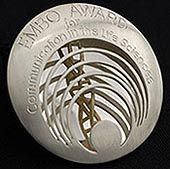K-State lab gives researchers the tools to study porcine circovirus associated diseases
Advertisement
porcine circovirus associated diseases cost pig producers around the world hundreds of millions of dollars each year. That's why Kansas State University virologists Dick Hesse and Bob Rowland have been working to create new vaccines to tackle such complex diseases.
"Circovirus and its associated diseases continue to emerge around the world," Hesse said. "Both porcine reproductive and respiratory syndrome and circovirus are a worldwide problem and they continue to evolve."
Hesse and Rowland say that because these viruses continue to adapt, the quick development of effective countermeasures like vaccines is critical, as is having the facilities in which to test the vaccine in a timely fashion. Later this month, they will begin testing their next-generation vaccine against circovirus at K-State's Biosecurity Research Institute, or BRI, in Pat Roberts Hall.
The vaccination experiment they are preparing is complex and will involve simultaneously testing several groups with porcine circovirus, porcine reproductive and respiratory syndrome, or a combination of the two. Testing vaccine efficacy against viral combinations will be crucial because that's when the most severe forms of disease occur, according to the researchers. For the purposes of experimentation, keeping each of the groups separate also will be crucial. The BRI is designed so that research on a multitude of agents can take place in rooms adjacent to each other so there is no cross contamination.
"The viruses that we are using have some very unique properties that make containment difficult. In the field, part of the challenge presented by circovirus is that it is easily spread," Rowland said. "We have a lot of experimental groups and under normal circumstances when you are working with infectious disease, it's difficult to prevent cross contamination."
Without the BRI, Hesse and Rowland would have to go elsewhere to conduct an experiment of this scale. They said the ability to do the research at the BRI will mean that the remedies for disease can be available to producers sooner.
K-State's Biosecurity Research Institute is a biosafety level 3 and biosafety level 3 agriculture research facility. Research at the BRI will help scientists develop a deeper understanding of the pathogens and pests that threaten the U.S. animal- and plant-based agricultural systems so that vaccines and other countermeasures may be proactively developed.

























































